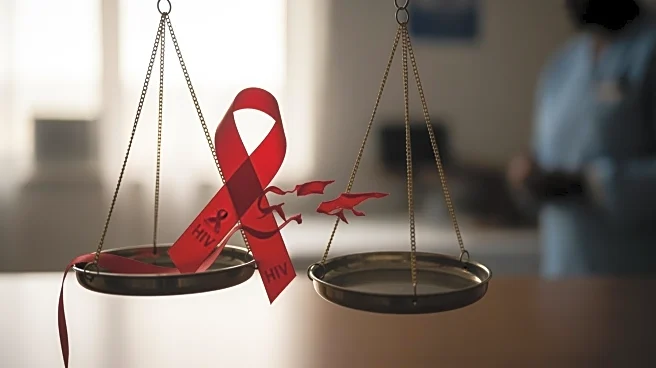What's Happening?
Lesotho, a small nation in southern Africa, is facing significant challenges due to massive cuts in U.S. foreign aid, particularly affecting its HIV/AIDS programs. Historically, Lesotho has had one of
the highest HIV infection rates globally, but U.S. aid helped establish a health network that slowed the epidemic's spread. However, recent aid cuts under President Trump have led to the closure of clinics, layoffs of healthcare workers, and disruption of treatment for HIV-positive residents. Although some U.S.-funded programs have been temporarily reinstated, the situation remains dire, with many fearing a resurgence of the epidemic.
Why It's Important?
The aid cuts have profound implications for Lesotho's public health, potentially reversing years of progress in combating HIV/AIDS. The disruption of key programs could lead to increased transmission rates, more deaths, and higher healthcare costs. The situation highlights the vulnerability of countries reliant on foreign aid for critical health services. The temporary reinstatement of some programs offers a glimmer of hope, but the long-term sustainability of Lesotho's health initiatives remains uncertain. The broader impact on global health efforts underscores the importance of stable international support for disease prevention and treatment.
What's Next?
Negotiations between the U.S. and Lesotho are underway to establish a multiyear funding agreement, but these discussions are expected to take months. Meanwhile, health workers in Lesotho are using informal networks to reach affected communities, though the effectiveness of these efforts is limited. The temporary U.S. programs aim to bridge the gap, but the long-term solution requires Lesotho to develop greater autonomy in public health. The situation serves as a wake-up call for Lesotho to reduce its dependency on international aid and strengthen its healthcare infrastructure.
Beyond the Headlines
The aid cuts raise ethical concerns about the responsibility of wealthy nations to support global health initiatives. The shift in U.S. policy towards direct government funding rather than through development organizations poses risks to established systems that have proven effective. The situation in Lesotho could serve as a case study for the consequences of abrupt changes in foreign aid policies, highlighting the need for careful consideration of the impacts on vulnerable populations.









